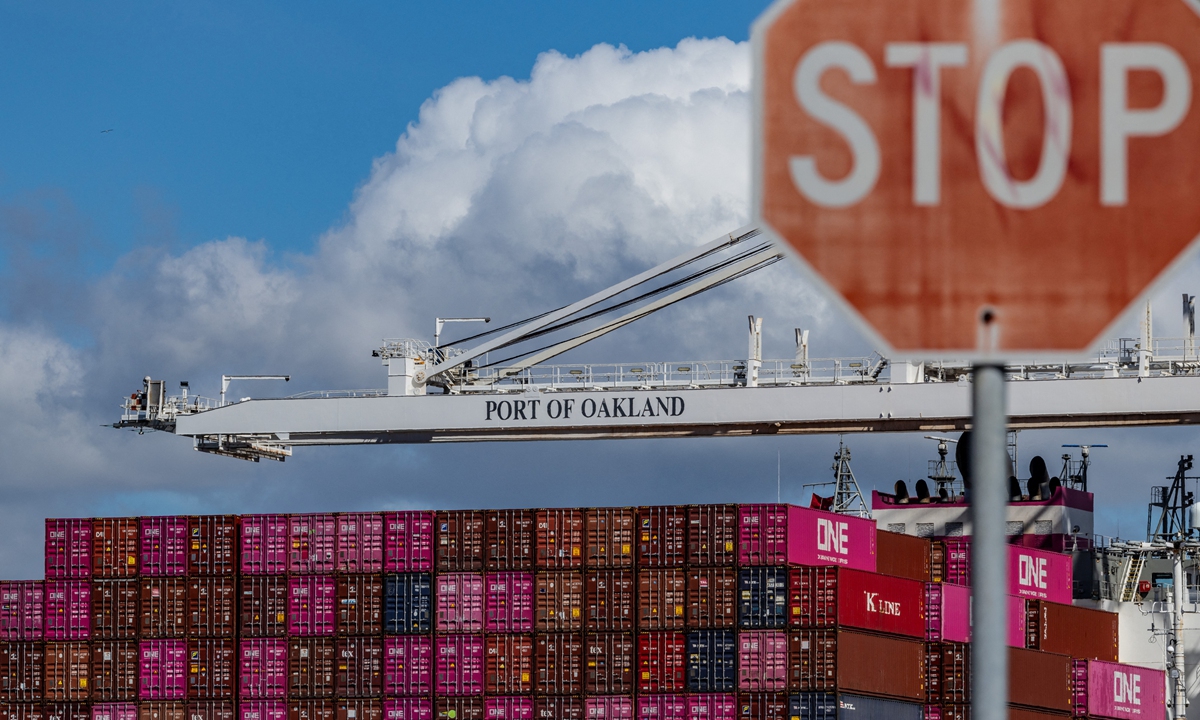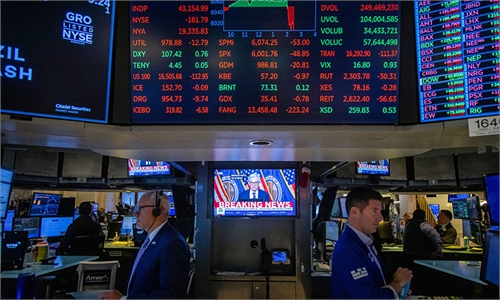Protectionism will only accelerate the ‘rusting’ of US’ shipbuilding industry: Global Times editorial

A cargo ship full of shipping containers is seen at the port of Oakland as trade tensions escalate over US tariffs, in Oakland, California, US, on March 6, 2025. Photo: IC
The Office of the United States Trade Representative (USTR) held a public hearing on Monday local time to solicit opinions on the proposed charge targeting Chinese-built or Chinese-flagged vessels. This public hearing placed the protectionist obsession of certain US politicians on the same arena as the pragmatic needs of global supply chains. Over 300 trade associations at the federal, state and local levels, as well as hundreds of companies and individuals, filed comments protesting the fees at the hearing.From ship brokers in Florida to farmers in the Midwest, nearly all groups were opposed to the port charge, foreshadowing the potential backlash against unilateralist policies and once again proving that protectionism is both detached from reality and widely unpopular.
The strongest opposition came from US businesses. Jonathan Gold, vice president of supply chains and customs policy at the National Retail Federation, stated that industry representatives see "this as more of a threat than the tariffs," as it will directly disrupt the stability of supply chains. Kathy Metcalf, CEO of the Chamber of Shipping of America, bluntly pointed out that replacing existing China-built vessels is not like flipping a light switch. Seaboard, the largest international cargo carrier in the US, operates a fleet of 24 vessels - 16 of which were built in China. Its CEO testified that imposing port charge on Chinese-made ships "unintentionally destroys American-owned carriers." Many business owners and industry representatives further argued that using port fees to revive the US shipbuilding industry is meaningless, as it would push American shippers and small and mid-sized ports into survival crises, drive up prices, slash exports, reduce jobs, shrink GDP, and even deal a devastating blow to US economy. These firsthand testimonies tore apart the illusion of "industrial revitalization" fabricated by some US politicians and exposed the fundamental paradox of protectionism - policies enacted in the name of safeguarding interests often end up hurting the livelihoods of Americans.
The implementation of port fees will also cause chaos in the global shipping industry, further devastating the already fragile global supply chain. Joe Kramek, President and CEO of the World Shipping Council, calculated that port fees could add $600 to $800 in costs per container. Experts and business representatives from the shipping industry have issued stern warnings: on the one hand, as shipowners from various countries reduce calls at US ports, ports in Canada, Mexico, and other nations may face increasing pressure, and shipping schedules worldwide will be disrupted; on the other hand, the pressure of rising global shipping costs will inevitably ripple through to other countries.
Soren Toft, CEO of Geneva-based MSC Mediterranean Shipping Co, the world's largest container shipping company, stated that the total industry impact by the port fees is likely to be more than $20 billion. Representatives from Caribbean countries believe that this measure will also hurt the region's oil and gas industries. Currently, the port fees are still under review, but many shipowners have already refused to offer quotes to US exporters. These voices indicate that the US' unilateral actions are no longer merely "domestic matters" but are harming the multilateral trade system.
These pragmatic voices from the front line make the USTR's "Section 301 investigation report" and the rhetoric of some politicians seem pale and powerless. They attribute the development of China's shipbuilding industry to the so-called "government support and subsidies," while deliberately ignoring a basic fact: China's shipbuilding success stems from the synergy of its entire industrial chain and sustained technological innovation.
A CEO of a shipping company that has been in operation since 1967 recalled in his four-page submission to the USTR that, in 2012, when he placed an order for five ships with each country's shipyards, Japanese companies refused to quote, Korean companies found the order too small, and American shipyards said they wouldn't be able to deliver them for at least seven years because they "were flush with US Navy orders." Only China's shipyards were able to immediately build complex, high-design ships at a "competitive price." This story illustrates the internal logic behind the shifting landscape of the global shipbuilding industry.
History has long proven that if the US wants to revive the glory of its shipbuilding industry, it should seek breakthroughs by addressing its own issues rather than trying to create a protectionist greenhouse. Once confidence in open competition is lost, protectionism will only accelerate the rusting of the US' shipbuilding sector.
Compared to economic considerations, some international observers believe that Washington's actions are more politically motivated. However, there are no winners in protectionism - only open cooperation can lead to long-term success. If the US continues to politicize trade and economic issues, it will ultimately be its own businesses and citizens who will suffer the consequences.
The vast Pacific Ocean can accommodate numerous ships; hopefully Washington will also adopt such broad-mindedness and vision. The USTR will hold another hearing on March 26, and it is hoped that the US will listen to voices from both home and abroad, meet China halfway, and seek win-win solutions through fair competition and cooperation.


